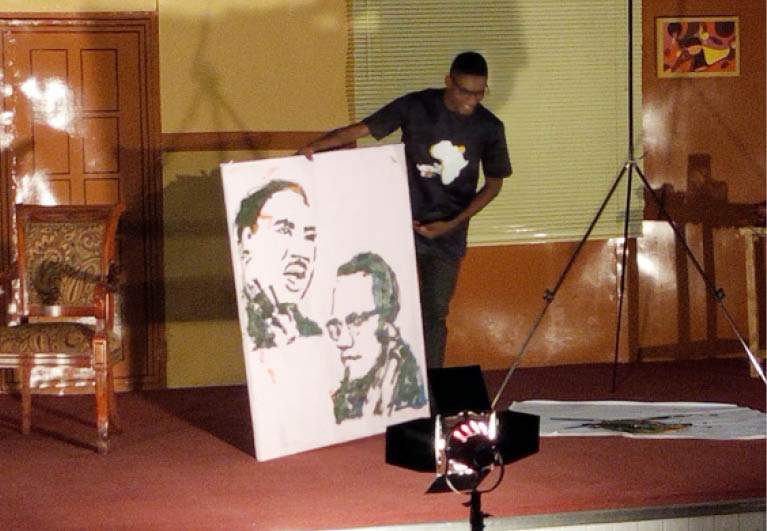Abuja: Dr. King, Malcom X, come alive
“We want part two!” This was the chant after the actors took a bow at the end of their performance of Jeff Stetson’s ‘The Meeting.’ The stage production was performed by staff and students of the Theatre & Performing Arts Department of the Ahmadu Bello University (ABU), Zaria, with support of the Embassy of the […]

Seun Adebayo completed the piece in minutes
“We want part two!” This was the chant after the actors took a bow at the end of their performance of Jeff Stetson’s ‘The Meeting.’ The stage production was performed by staff and students of the Theatre & Performing Arts Department of the Ahmadu Bello University (ABU), Zaria, with support of the Embassy of the United States of America, Abuja.
The evening started on the right note, with Seun Adebayo of the ABU Fine Art Department, drawing both men from scratch before the audience who were wowed by his dexterity.
The tempo further heightened with the performances of Nathan Kure (Malcom X) and Abdulaziz Attah (Martin Luther King Jnr.) whose costumes, hairstyles, accents and mannerisms kept the audience glued to their seats and yearning for more, line after line.
The play which was staged in celebration of the black History Month, according to Public Affiars Officer of the Embassy, Mr. Aruna Amirthanayagam, was selected for its strong demonstration of the Civil Rights movement in the US.
Speaking on its relevance to contemporary issues, he said, “30 years after it was released, I believe a lot of the issues it raises, are still with us. It clearly speaks to contemporary issues. Nigeria and the US share similar challenges when it comes to unity, cohesion and divisions. This play illustrates two different ways of solving problems and finding the right balance between them.”
Analyzing the performance, Amirthanayagam, who had seen the production before in Kenya described this as the best he had so far seen.
The play’s director, Dr. Emmanuel Gana, described directing the play as a bit challenging. He said, “it was important to understand the history between both personalities, their mannerism and what they stood for. Also, because it is a dialogue, it was difficult trying to create the picture to ensure that people understand and enjoy the message as well as take away the entertainment value.
The dances infused into the play made it contemporary and relatable for the audience. Gana said, “We tried to think outside the box. However, watching videos of both characters. The actors were able to internalize the roles to some extent and communicate effectively on stage.”
For Kure, being Malcolm X and playing the character of someone who actually lived was tasking. “I had to do a research on him, watch his videos and try to make my voice sound like his. At some point at night, I found myself dreaming about some of the movies I had watched about him. It was interesting in such a way that I was trying to live a life of a man who had passed through time and is no more. I tried to see that I made people who knew him appreciate that I was really playing the character they knew.”
Final year Theatre student, Attah, described the experience as one like he hadn’t had before. “Regardless, it was a good experience rehearsing for and playing the role. I had learned about Dr. King as a young child from my father who was his fan and listened to his speeches. A little bit of research and watching movies and documentaries helped me prepare for the role,” he said.
There was an actual meeting between Dr. King and Malcom X in Harlem in 1965 but there was no recording of what was said. If the conversation had to be imagined, the play was as imaginative as could be.
